Article Contributed by L. Paul Mann
Published on 2025-10-11
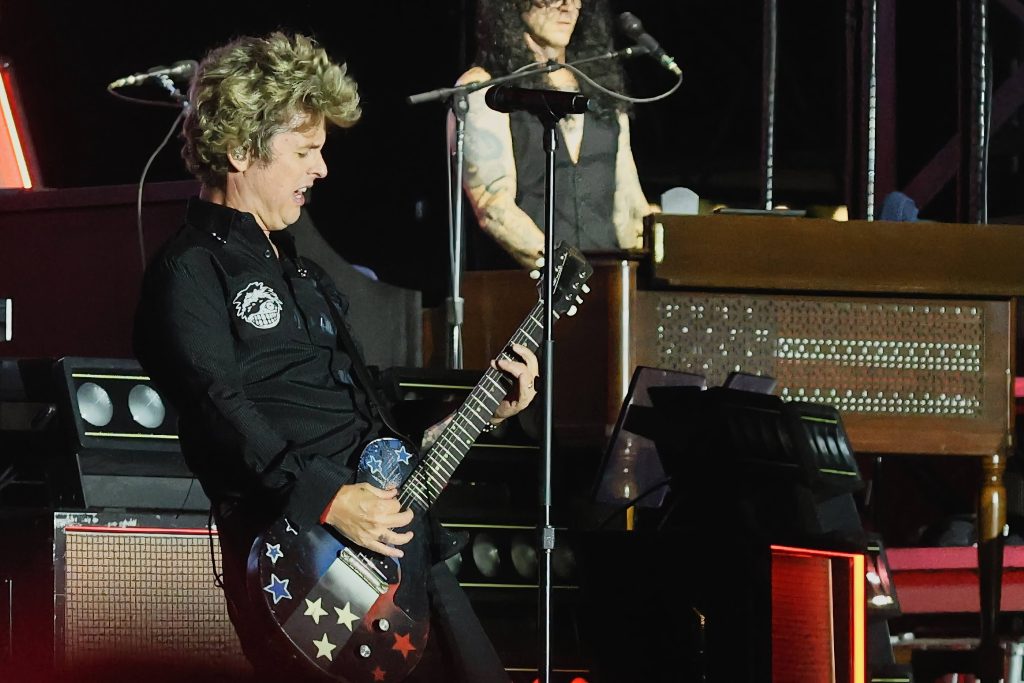
By Sunday, the final day of the 2025 Ohana Festival, Doheny State Beach was both calm and wild. The salty Pacific breeze echoed with surfboards and amplifiers as the weekend’s most intense lineup played under an orange sky. If Friday evoked nostalgia and Saturday leaned soulful, Sunday unleashed raw punk energy—a celebration of purpose and persistence.
Doheny Beach, next to the festival, buzzed with surfers riding four-to-six-foot swells from the remnants of Hurricane Narda. The warm sun beat down as Skating Polly kicked off the festival with an explosive set. The Oklahoma trio wasted no time: their self-described “ugly pop”—a mix of punk ferocity, melody, and emotion—was more vivid live. At Ohana 2025, their cathartic performance surpassed expectations.
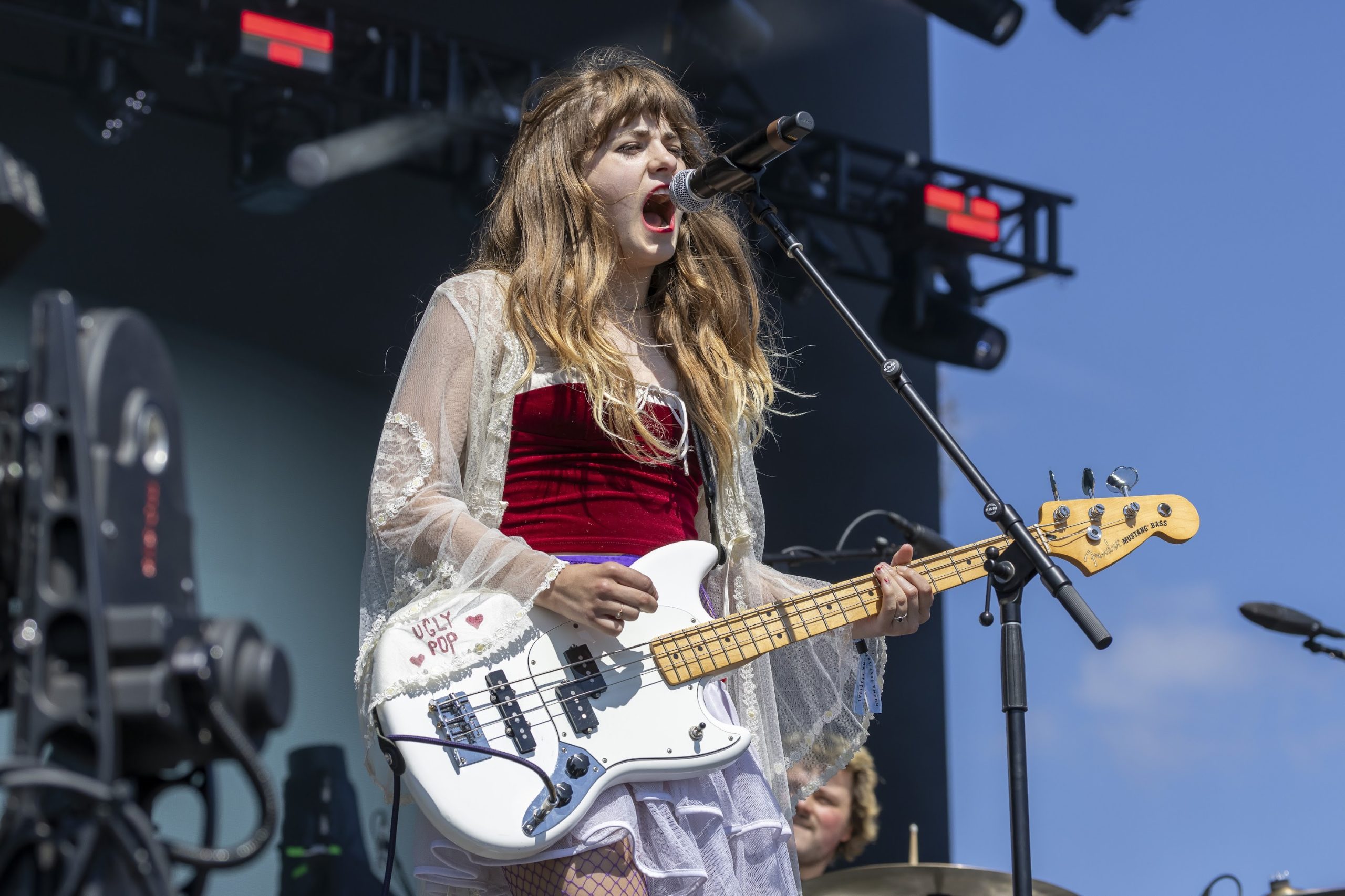
Opening with “Sing Along,” the band came out swinging. Kelli, alternating between bass and keys, hurled her vocals like daggers—half-sung, half-howled—while Peyton’s guitar churned through crunchy chords that kicked up sand and adrenaline alike. Kurtis, the youngest of the trio, hit the drums with the kind of joyful violence that felt contagious. The sound was massive, defiant, and alive.
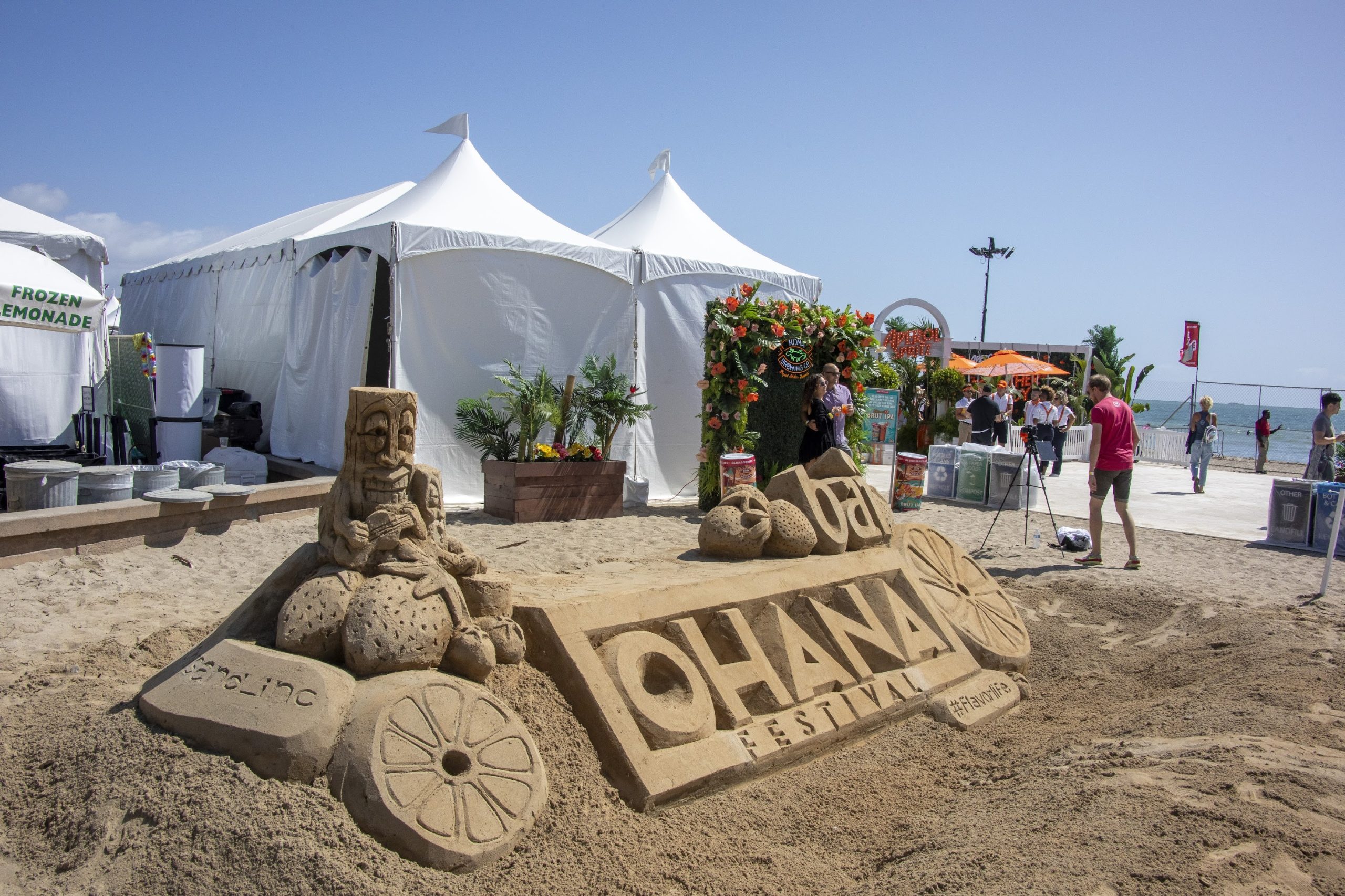
From there, they ripped into “Hickey King” and “Free Will at Ease,” turning the festival’s early-day calm into a proper punk baptism. People who’d wandered in with iced coffees found themselves head-bobbing, shouting, and, by the third song, cheering like it was midnight.
What makes Skating Polly so magnetic—and what became obvious in Dana Point—is how they channel the spirit of riot grrrl and ’90s alt-rock without ever falling into imitation. They sound like the next chapter, not a nostalgic tribute. You can hear echoes of Bikini Kill, The Breeders, and Sleater-Kinney, but also the melodic instincts of Veruca Salt (whose Nina Gordon and Louise Post have produced the band).
During “Little Girl Blue and the Battle Envy,” Kelli’s voice cracked and soared in equal measure, the lyrics unspooling like a diary entry shouted into a storm. When Peyton took over on vocals, her smoother tone brought contrast—proof that the band’s power lies in its duality: rage and sweetness, snarl and shimmer.
After Skating Polly, Nashville’s The Criticals took the stage, shifting the energy with sharp riffs and sweat-drenched swagger. Their blend of garage rock and Britpop polish landed perfectly in the warm midday light—danceable, confident, and just the right amount of reckless. “Clever Girl” and “Keep Me High” proved they weren’t just a filler set; they were a full-blown vibe. The band’s cover of Nine Inch Nails’ masterpiece “Closer” had an early mosh pit going strong in the crowd.
If Skating Polly threw the first punch, Lambrini Girls lit the fuse. The Brighton trio stormed the stage with fierce political fire, shouting down misogyny and apathy between breakneck blasts of noise. They transformed punk protest into performance art, whipping the crowd into a frenzy. At Ohana—a festival often drenched in surf-rock cool—their ferocity felt like a necessary jolt.
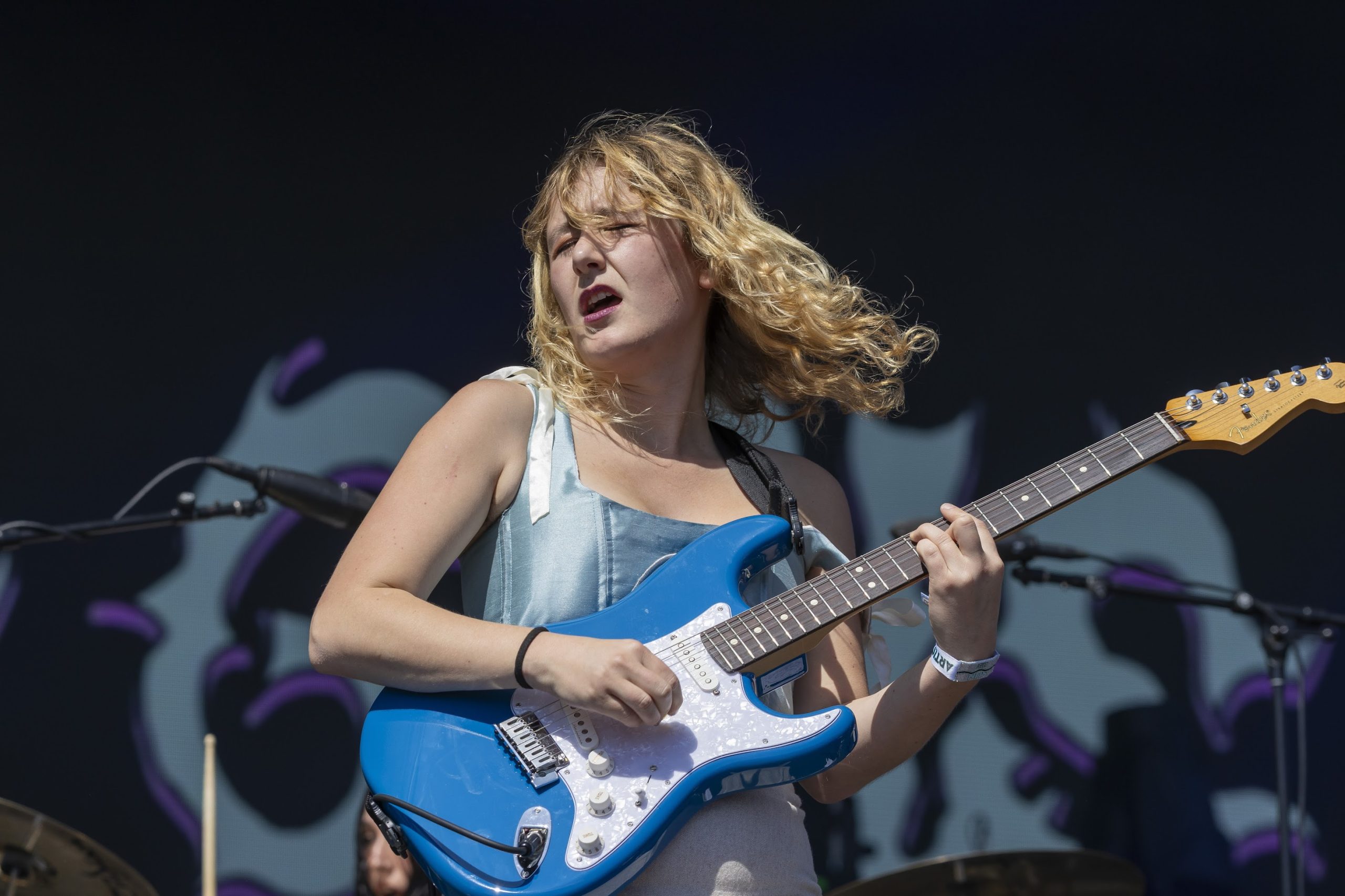
The band—vocalist/guitarist Phoebe Lunny, bassist Livi Poole, and drummer Toni Coe-Brooker—are part of a new wave of British punk that fuses the riot grrrl ethos with modern political urgency. Their arrival on the beach stage wasn’t just a set; it was an act of rebellion.
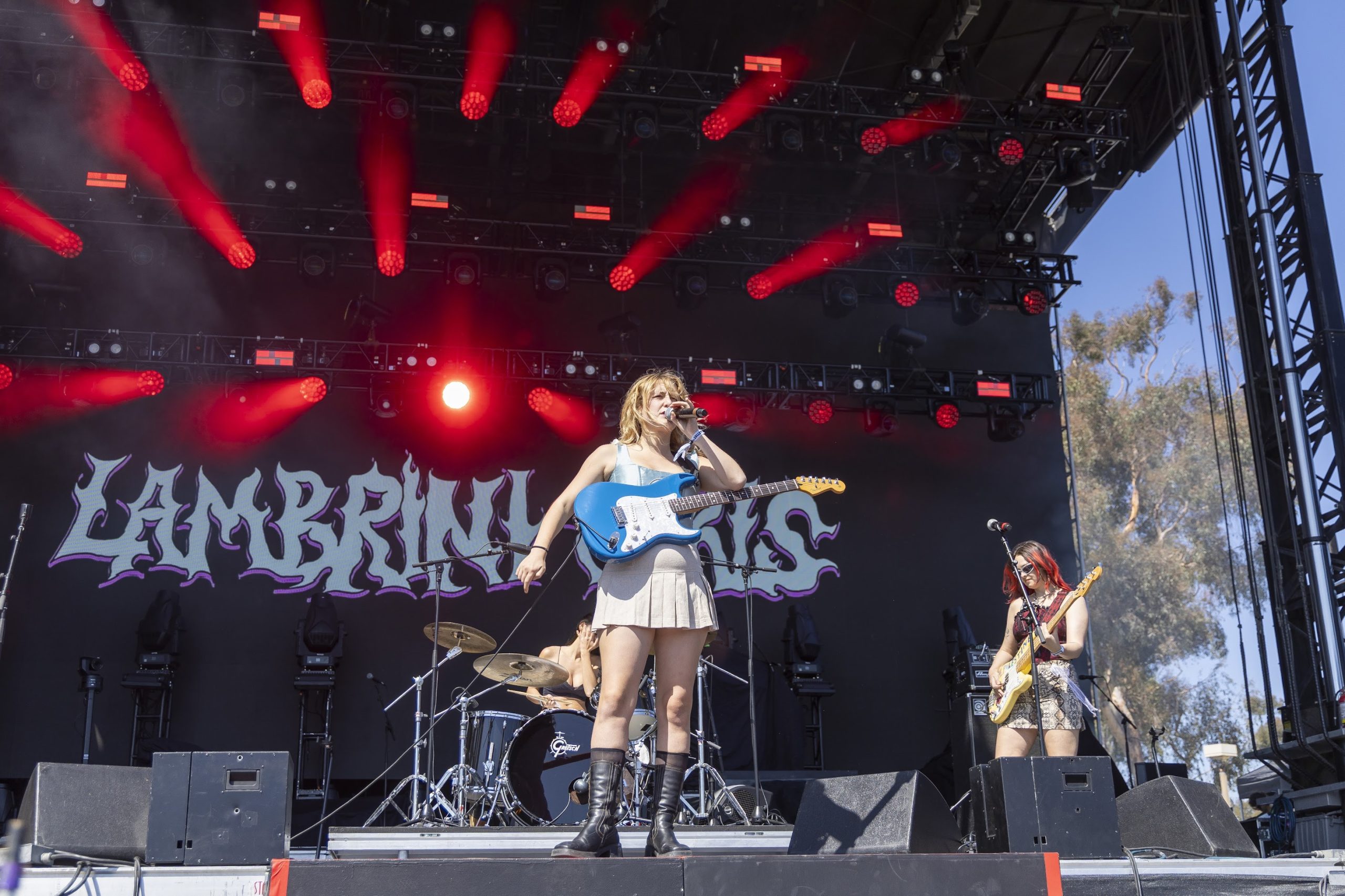
“Ohana, are you ready to talk about the patriarchy?” Phoebe shouted midway through the first song, her grin half-mocking, half-inviting. The crowd—a mix of curious onlookers, committed punks, and Vedder disciples—roared back.
The beauty of Lambrini Girls is that beneath the chaos lies craft. Their songs move with intent—tempo shifts, sneering harmonies, tight rhythmic interplay. Tracks like “Big Dick Energy” and “Gods Country” tore through the speakers with searing precision, mixing satire with rage. They weren’t just playing punk; they were weaponizing it.
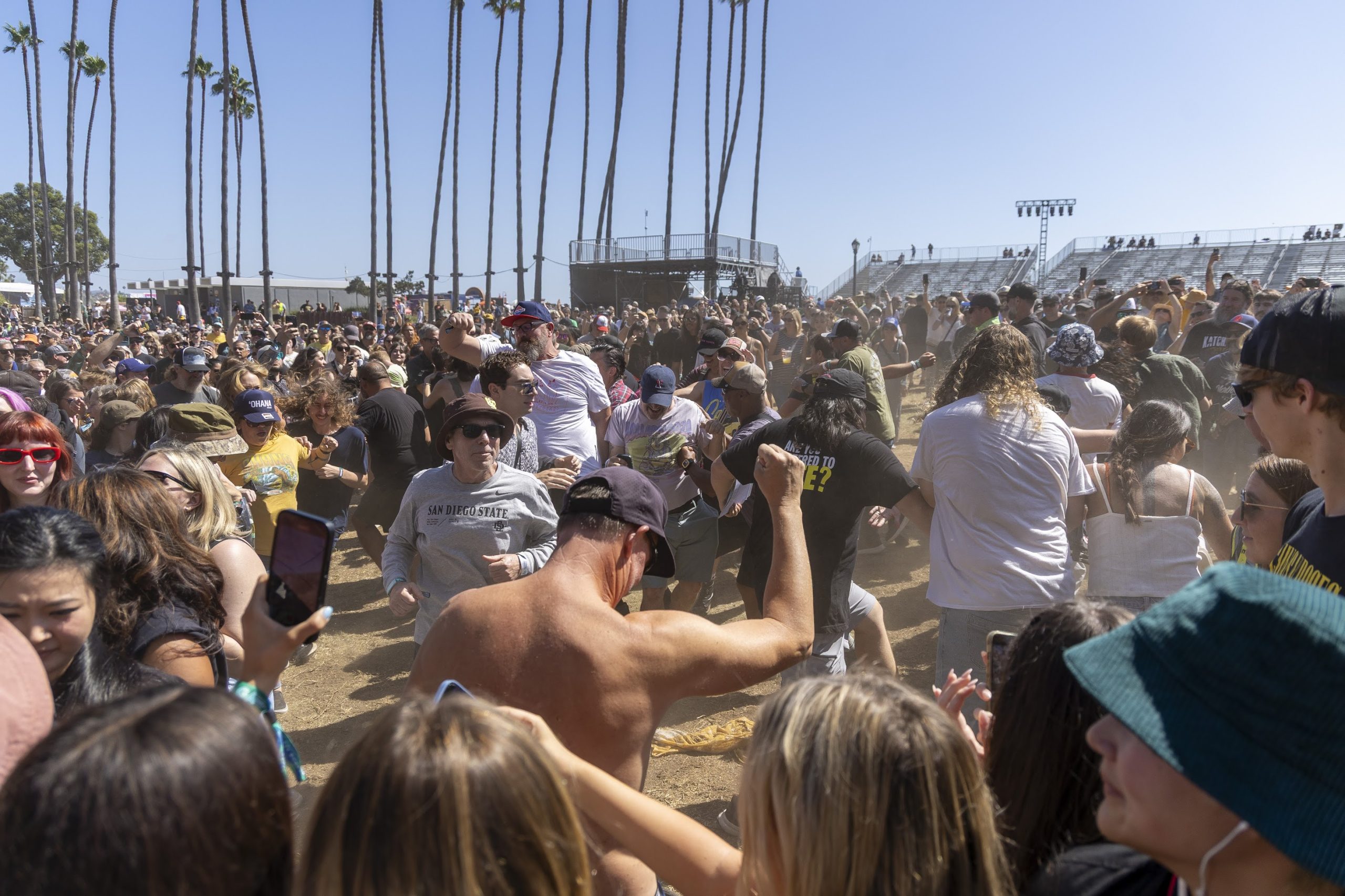
During “No Homo,” Phoebe stalked the front of the stage, pointing her guitar like a bayonet toward the crowd. The lyrics—playful yet politically barbed—became a rallying cry for liberation, identity, and joy. The performance teetered on the edge of chaos but never lost control. Every feedback squall, every shouted refrain, felt intentional.
At a festival like Ohana—curated by Eddie Vedder, long steeped in themes of activism and community—Lambrini Girls’ presence felt more essential than surprising. Still, their rawness stood out in stark contrast to the festival’s polished main stage acts. Amid the sunshine and surf culture, their set became a moment of radical subversion.
Between songs, Phoebe spoke openly about misogyny in the music industry, LGBTQ+ rights, and the importance of solidarity in the face of ignorance. “You can’t change the world with good vibes alone,” she said. “You’ve got to make some bloody noise.” The crowd—now twice as large as when they began—answered with cheers, fists, and laughter.
When it was over, Phoebe dropped her guitar to the ground, thanked the crowd for “listening to a bunch of angry women from the UK,” and walked off smiling. It wasn’t humility; it was satisfaction. Lambrini Girls had done what few can do at a massive, corporate-sponsored festival—they hijacked the energy, flipped it upside down, and left the audience changed.
As Lambrini Girls exited, the punk-drenched theme persisted with the next act. High Vis brought a heavier weight. Their blend of hardcore grit and Brit-tinged melodic sensibility made for a cathartic, tightly wound set. The emotional tension between aggression and lyricism gave their performance some of the day’s sharpest edges. The London five-piece brought a storm of grit and grace, proving that punk doesn’t have to be loud for the sake of it; it can also be a vessel for survival, solidarity, and release.
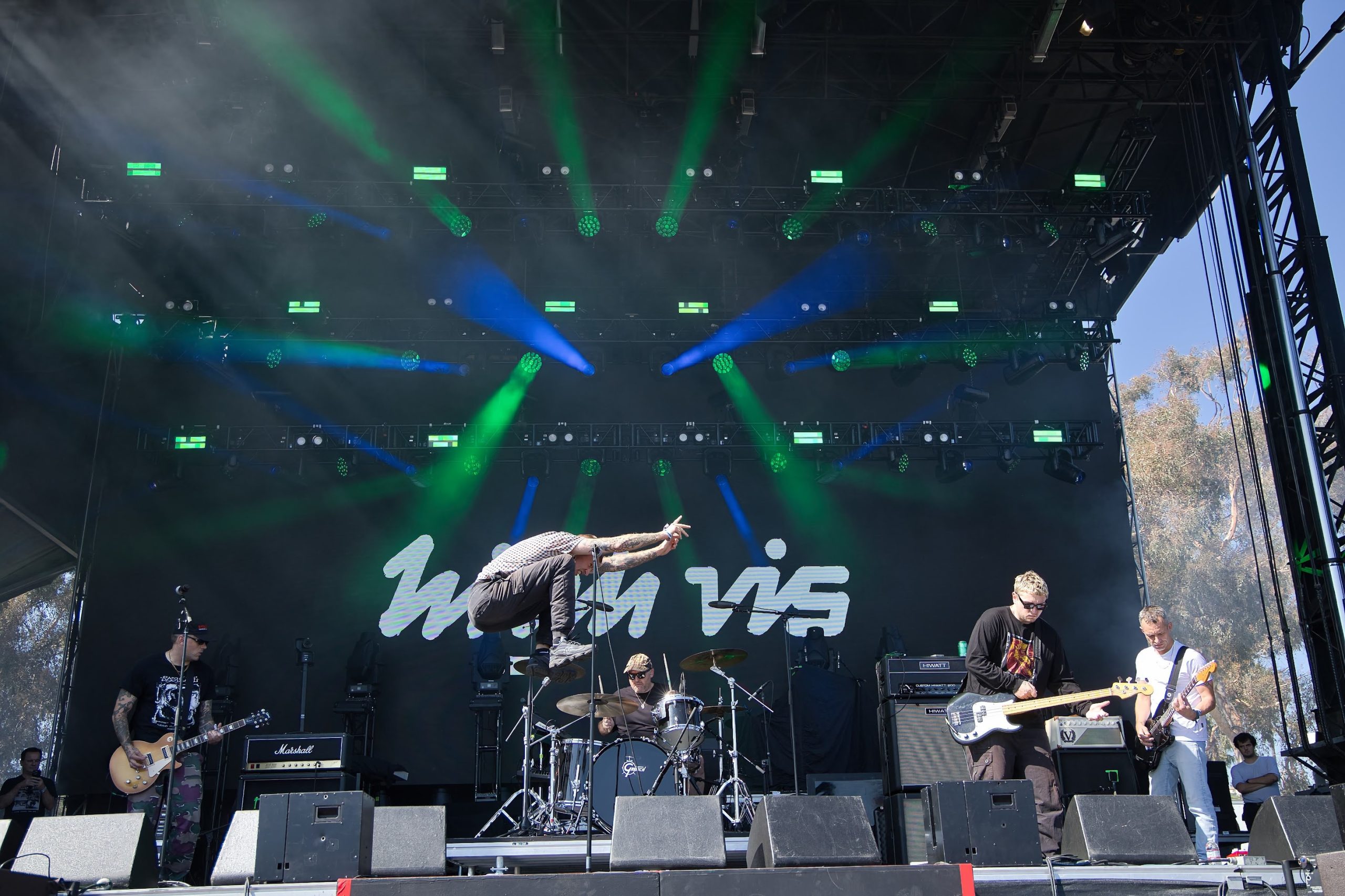
Under the swaying palms of Doheny State Beach, High Vis—fronted by Graham Sayle—delivered a performance that was equal parts catharsis and communion. They may have been thousands of miles from home, but the emotion was unmistakably universal.
Opening with “Talk for Hours,” the band set an immediate tone of tension and uplift. Sayle, dressed simply in jeans and a white tee, sang with an urgency that cut through the coastal air. His voice, roughened by life and conviction, carried the weary poetry of working-class Britain—the kind of truth that doesn’t need metaphor to hurt.
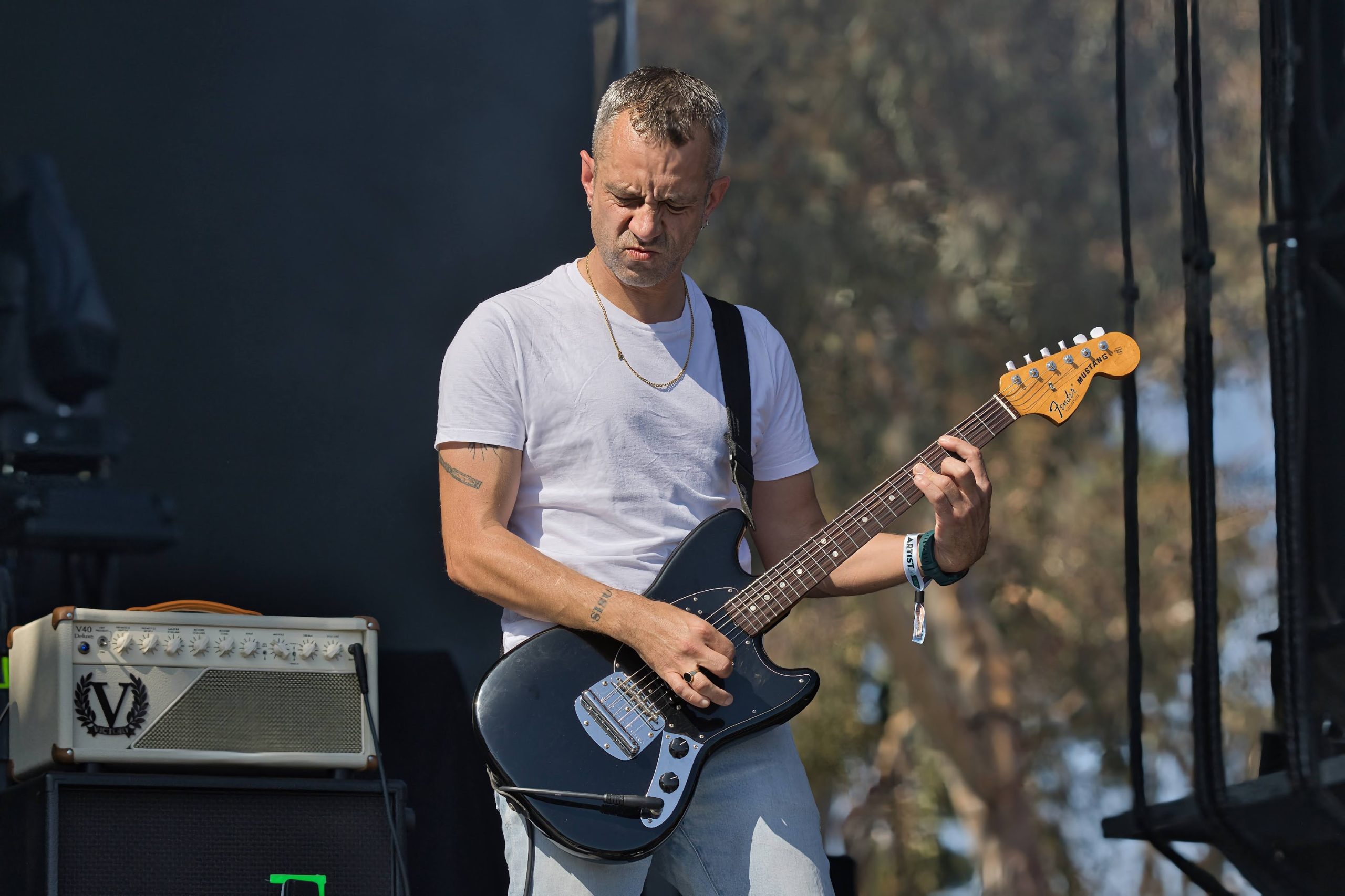
Behind him, Rob Moss’s guitar shimmered and snarled, echoing early Britpop textures while retaining hardcore punch. The rhythm section—thick and relentless—kept everything grounded, pulsing with life even in the song’s quieter moments.
High Vis occupy a rare space where hardcore punk meets post-Britpop melodicism, and that duality came alive at Ohana. On “Trauma Bonds,” the crowd swayed and shouted the chorus back at Sayle, even those who didn’t know the words catching on by instinct. The song’s emotional core—that tension between damage and redemption—hung heavy in the sea air.
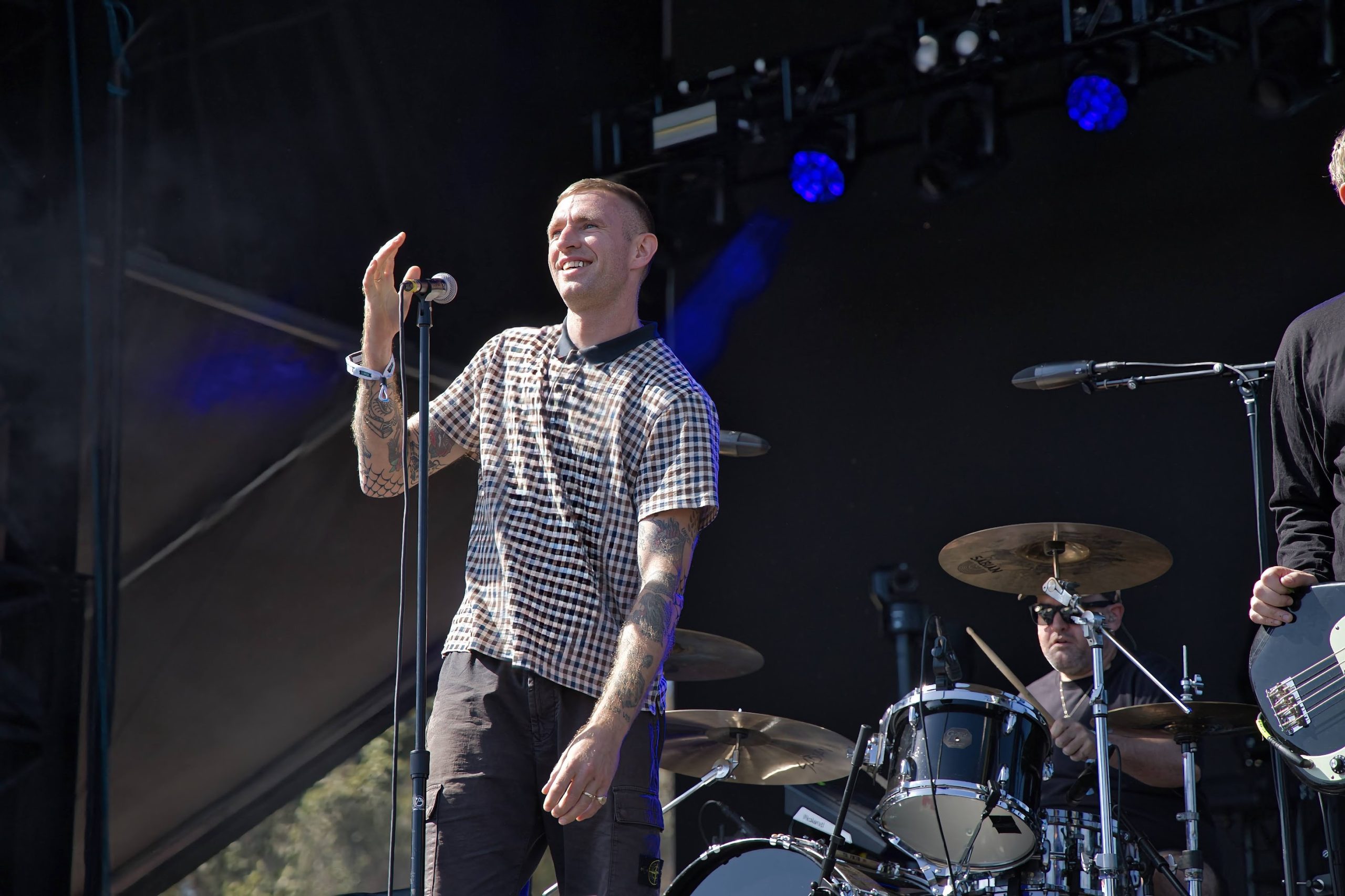
Sayle’s between-song banter was disarmingly genuine. “We’re from London—this sun’s a bit much for us,” he joked, wiping sweat from his brow. But then he turned serious. “We play songs about working-class life, loss, and love. About trying to hold onto something real. So if you’ve ever lost someone, or felt forgotten—this one’s for you.” That introduction led into “0151,” a love letter to community disguised as a battle cry.
There was something almost spiritual about the final moments of their set. As the last chords of “Choose to Lose” rang out, Sayle stepped to the edge of the stage, scanning the sea of faces, and simply said, “Look after each other.” No encore, no theatrics—just a quiet affirmation.
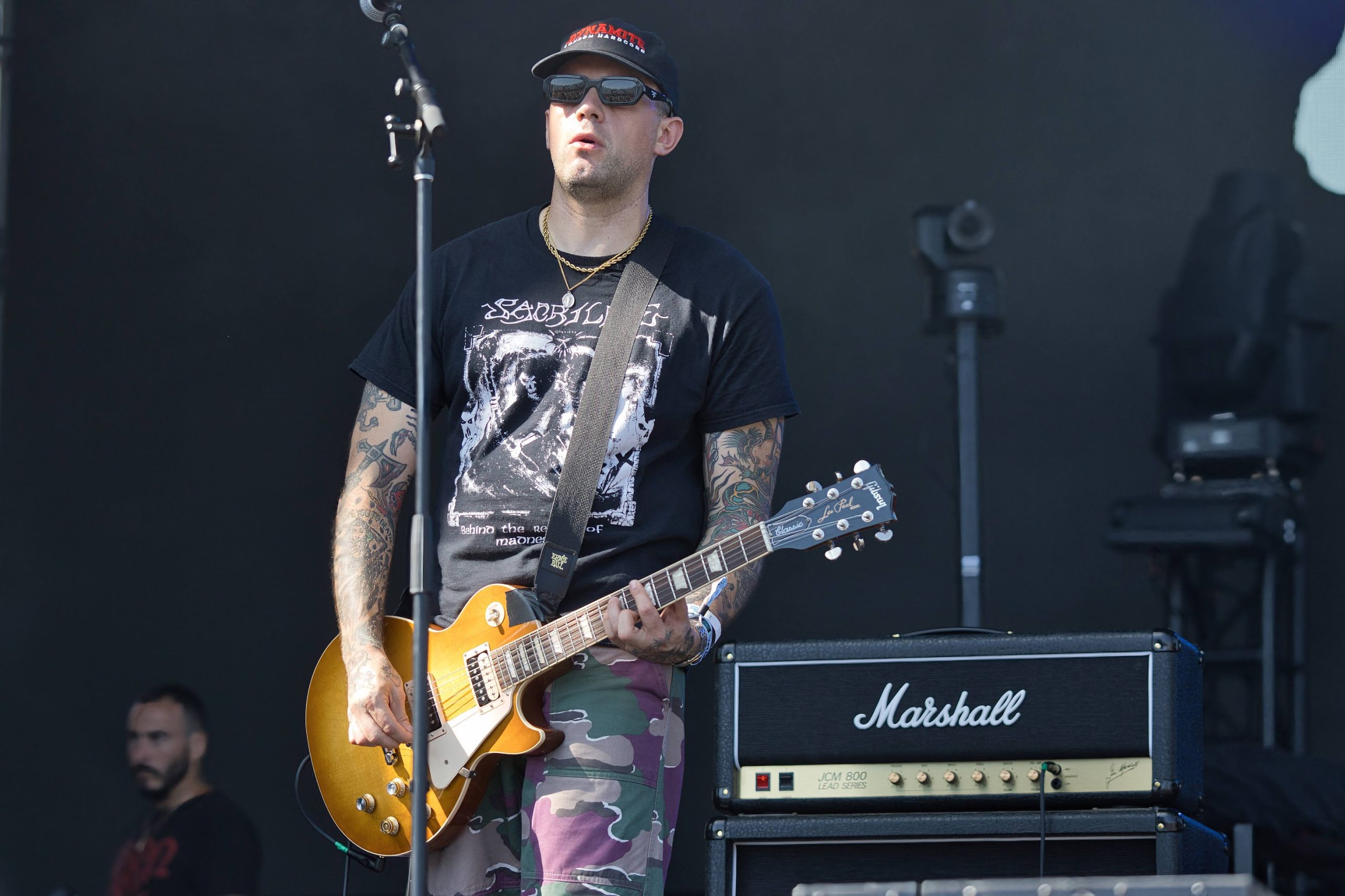
For a festival founded by Eddie Vedder, whose ethos centers on empathy and connection, High Vis felt like the perfect embodiment of that mission. Their set wasn’t about rebellion for its own sake; it was about resilience, about finding grace amid struggle.
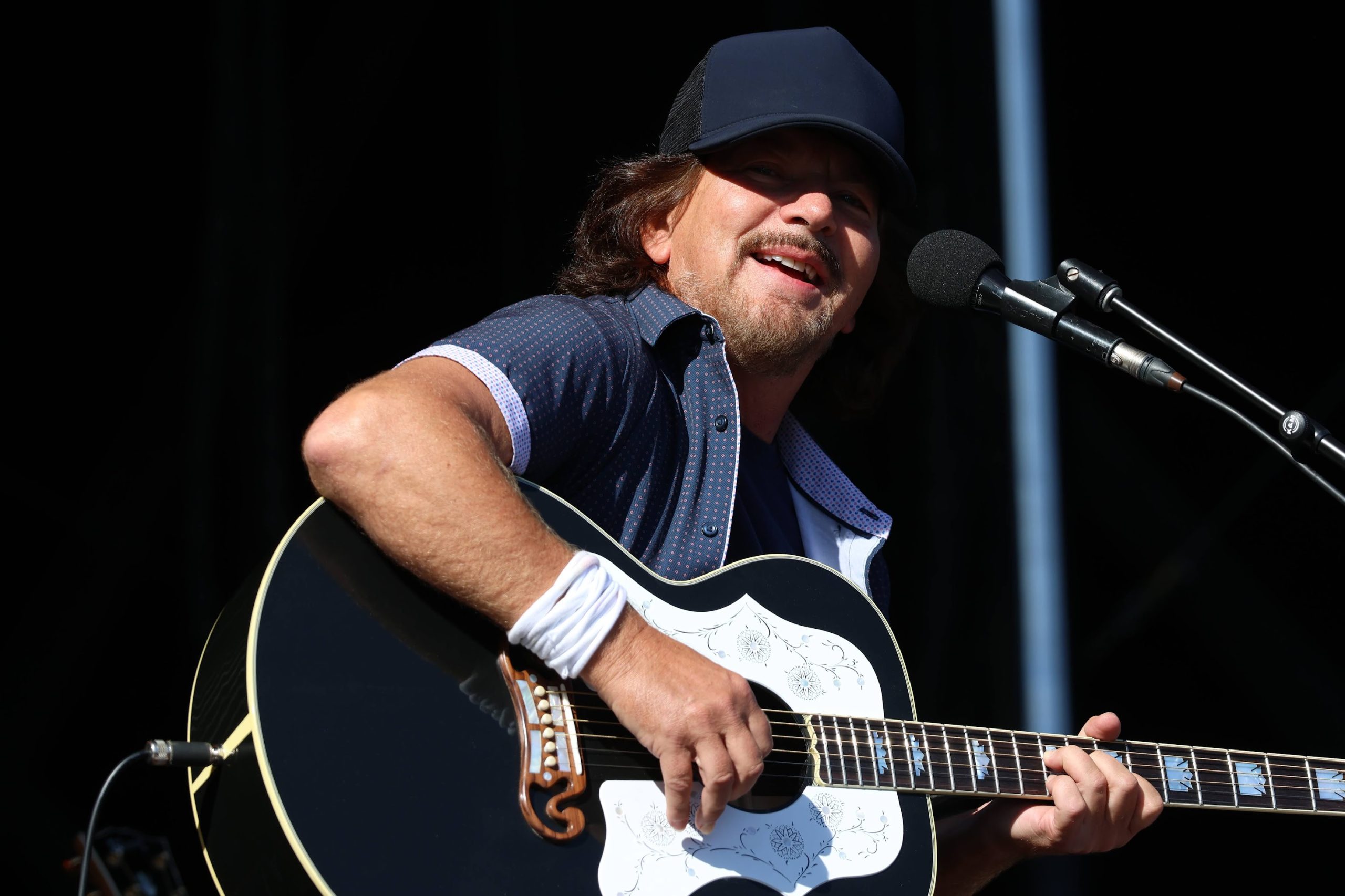
Mid-afternoon, Eddie Vedder appeared as “Amanda Reckonwith,” his playful alter ego, joined by Glen Hansard for an acoustic set. Between stripped-down covers and heartfelt banter, Vedder showed Ohana that intimacy values are just as important as volume. It was a surreal and quietly touching interlude. Vedder explained that the name came from his admiration for The Who’s bassist, John Entwistle, who used it at hotels so that only friends would recognize him.
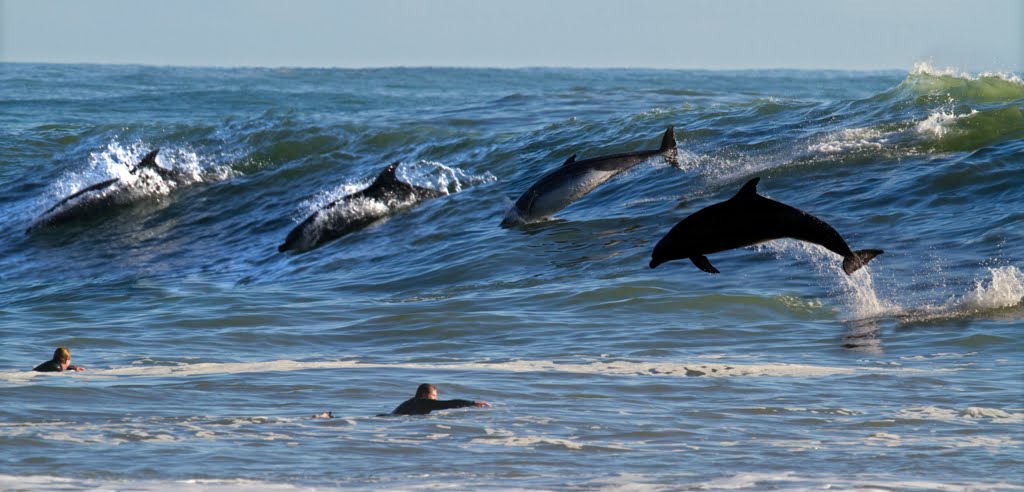
Vedder shared another story before playing, about watching dolphins pirouette in the waves. With a beaming smile, he said he wishes to be reborn as a dolphin since “they don’t have to watch television.” He then joked about booking an acoustic act amid punk, quipping, “This is your punk-rock halftime show.” Behind the humor lay real depth—a set that shifted from parody to meaning, again showcasing Vedder’s knack for finding humanity.
When the Sunday bill teased a set by someone called Amanda Reckonwith, the crowd knew to expect the unexpected. At Ohana Festival, surprises are practically tradition—but this one was special. What unfolded wasn’t a gimmick or a sideshow, but a rare and radiant moment: Eddie Vedder, performing under one of his playful aliases, joined by Glen Hansard for a stripped-down, luminous performance that felt less like a festival opener and more like being invited into their living room by the sea.
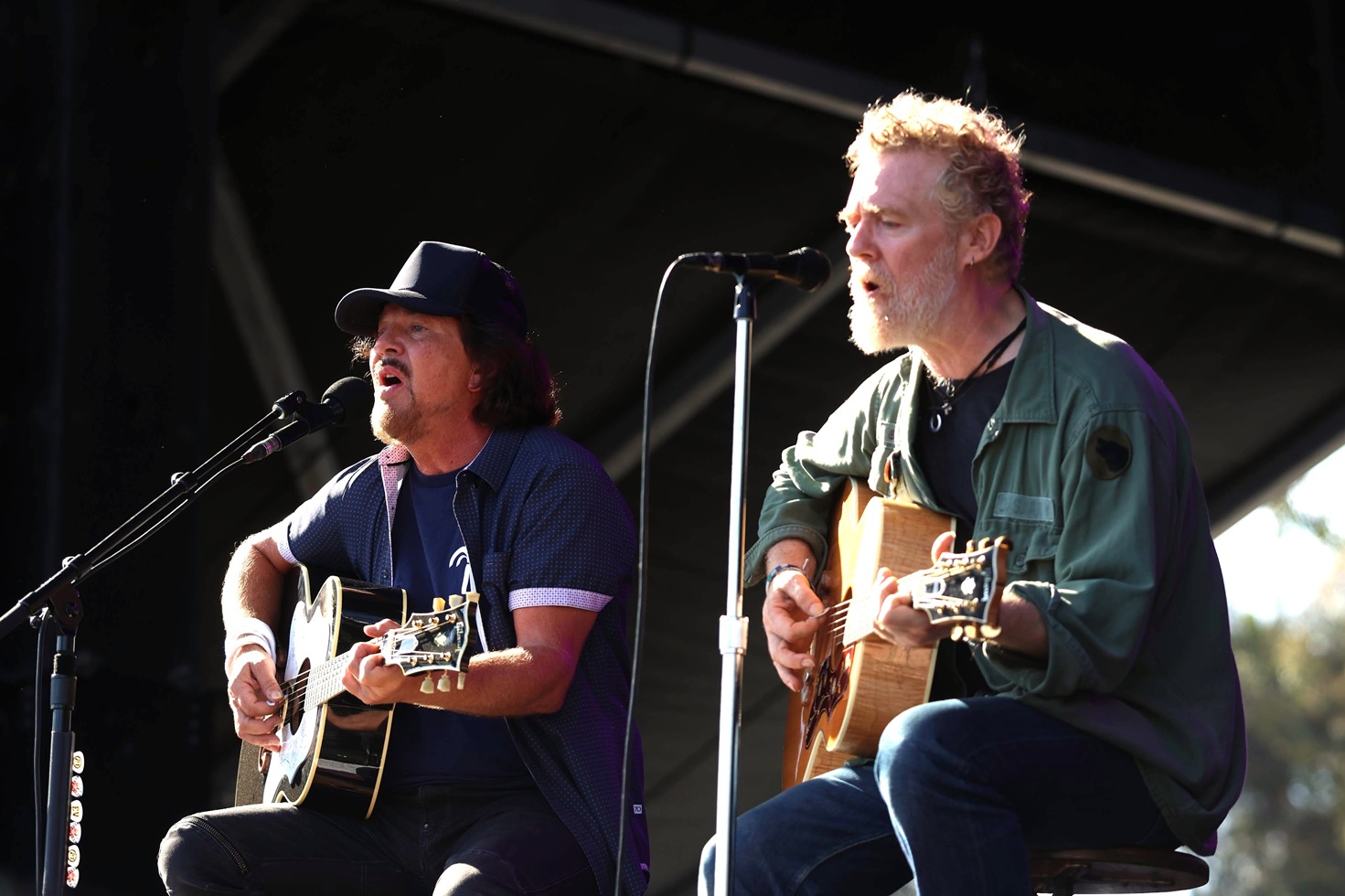
Their five-song run unfolded like a quiet tide. Hansard’s “Song of Good Hope” shimmered with optimism, his voice cracking beautifully at the edges, while “Falling Slowly”—the Oscar-winning ballad from his Swell Season days—drew the crowd into a collective hush. The harmonies between Hansard and Vedder felt effortless, forged in friendship and carried by the Pacific breeze.
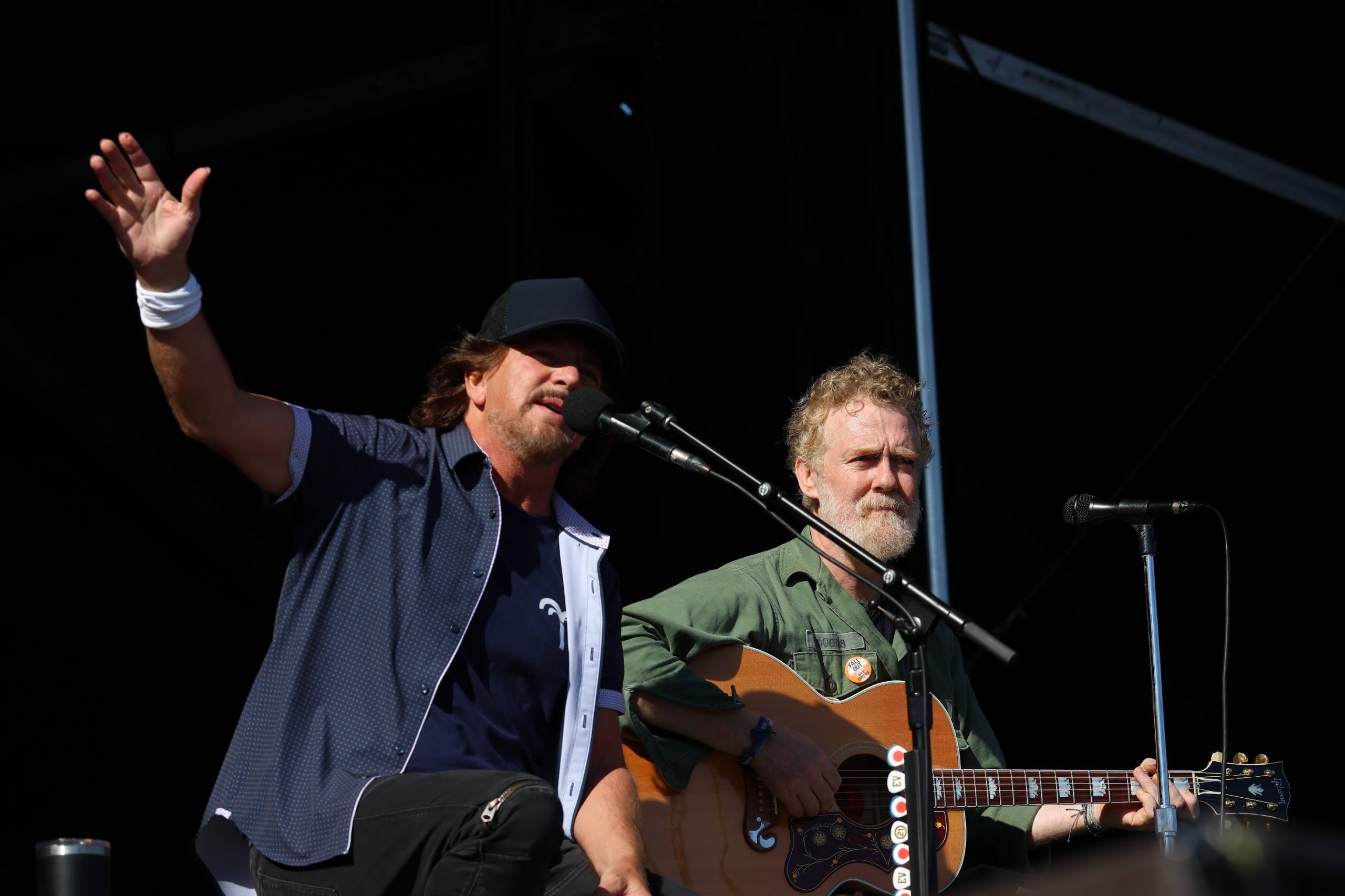
Vedder, in turn, reached into his own songbook for “Society” and “Hard Sun,” both familiar to fans of Into the Wild but newly charged in this setting. Against the backdrop of Doheny State Beach, their lyrics about isolation, longing, and human connection resonated differently—not as laments, but as meditations on togetherness in the face of vastness. Each chord seemed to ripple outward, blending with the surf and the murmuring crowd.
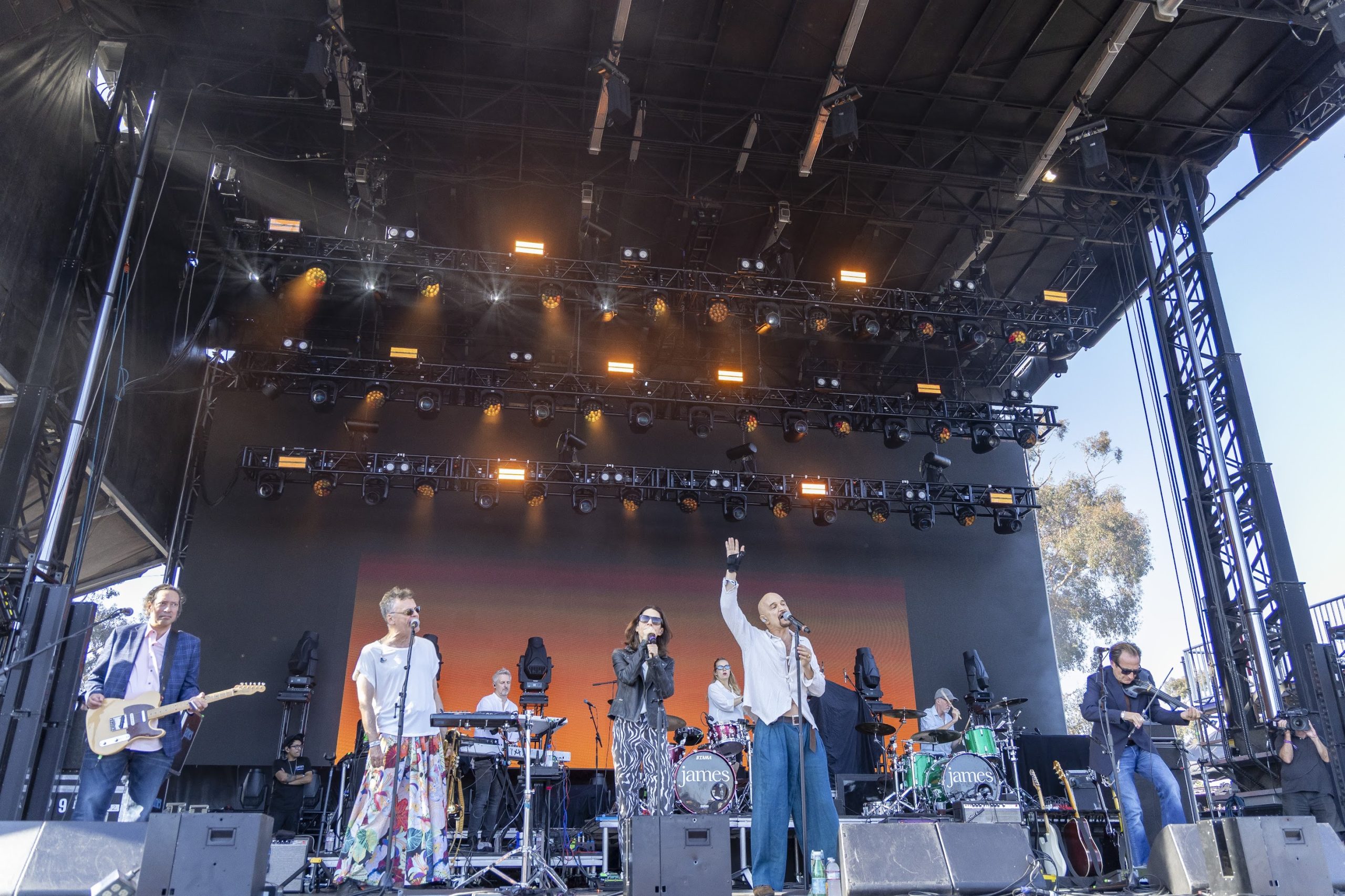
As the late afternoon light spilled across Doheny State Beach, the British band James delivered one of the most transcendent sets of the weekend—a performance that balanced euphoria, vulnerability, and a kind of communal grace that few bands can summon after four decades together.
Frontman Tim Booth, ever the spiritual showman, bounded onto the stage barefoot and radiant, his presence a blend of mysticism and mischief. “We brought the Manchester rain with us,” he joked, glancing at the clear California sky, “but it looks like you ordered sunshine.” What followed was a set that shimmered like the ocean behind them—expansive, soul-stirring, and alive with gratitude.
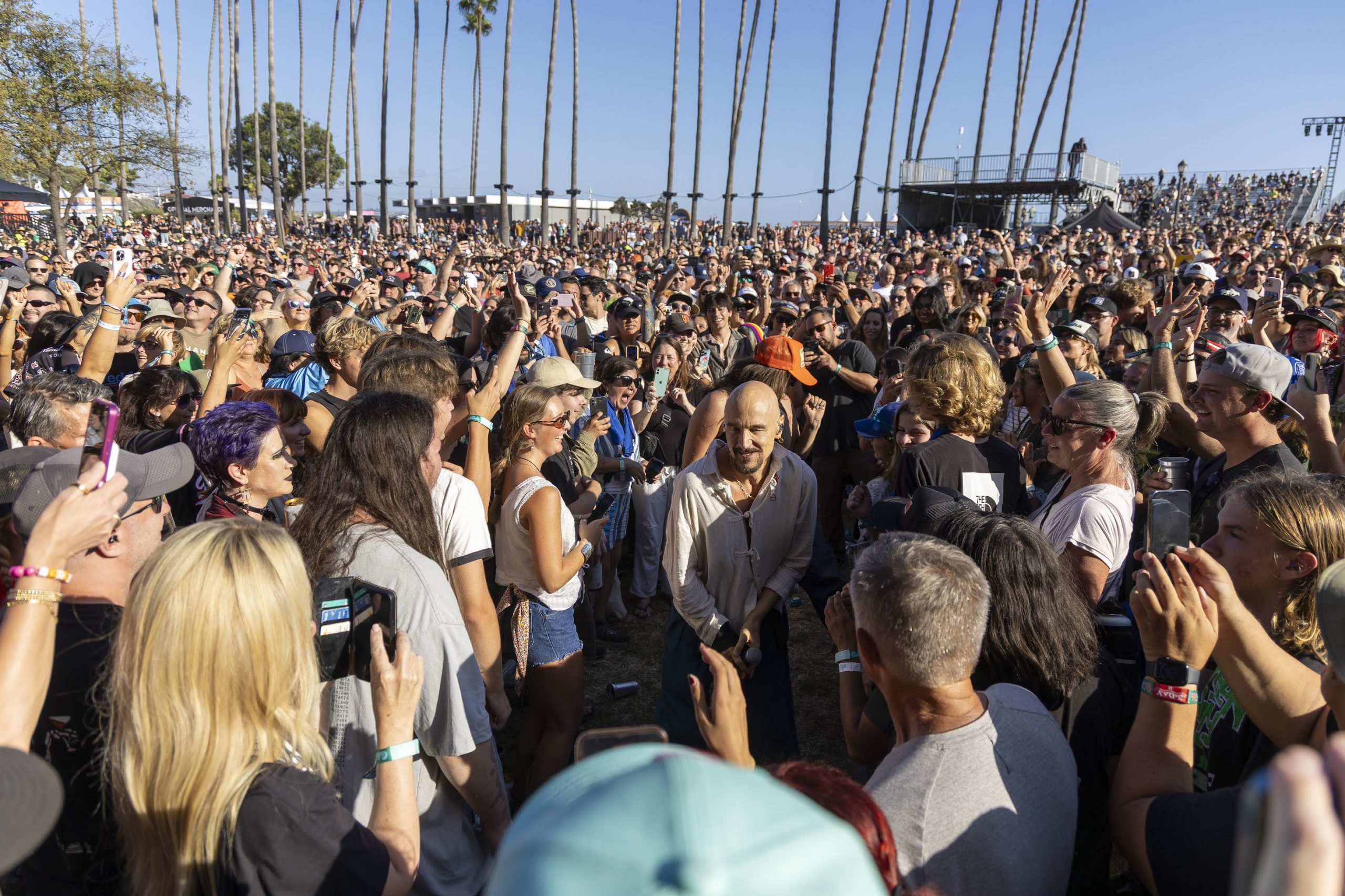
Led by the ever-charismatic Booth, the Manchester veterans delivered a set that was equal parts spiritual and euphoric. Booth’s connection to the audience was immediate and physical—he didn’t just sing to the crowd, he joined it. Throughout the afternoon, he made multiple trips offstage, weaving through fans, dancing with abandon, and turning the performance into a shared experience rather than a spectacle.
Their decades together were evident in the way they played off one another: loose but utterly in sync. The band’s sound—a lush blend of pop melodies, anthemic crescendos, and textured instrumentation—felt both intimate and expansive, the kind of music that could fill a stadium or soothe a shoreline.
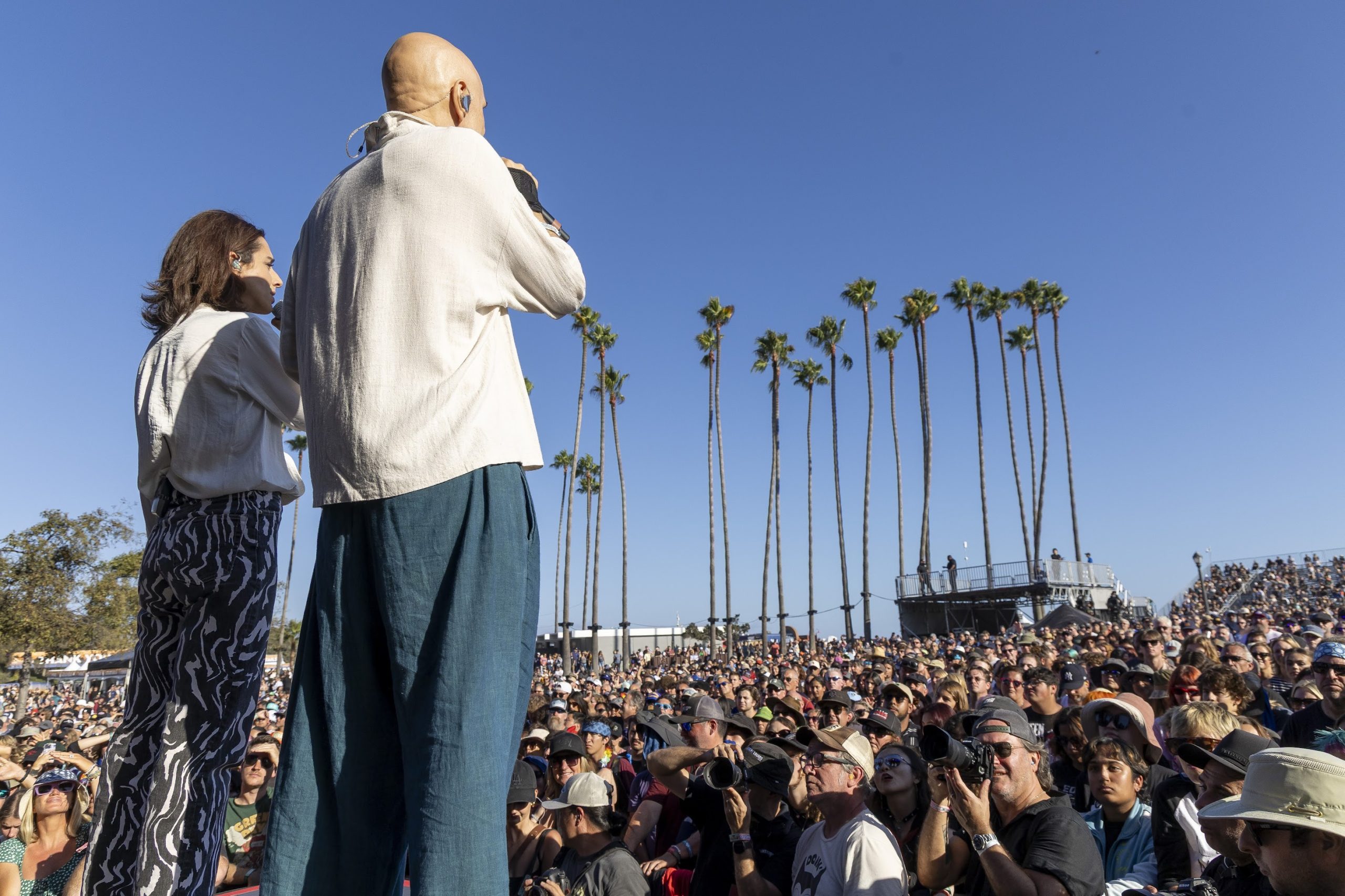
At one point, Booth laughed between songs and confessed, “We just kinda come up here and improvise. We don’t know what the fuck we’re doing.” The crowd erupted—the humility of the statement only underscoring how effortlessly polished and emotionally precise the band truly was.
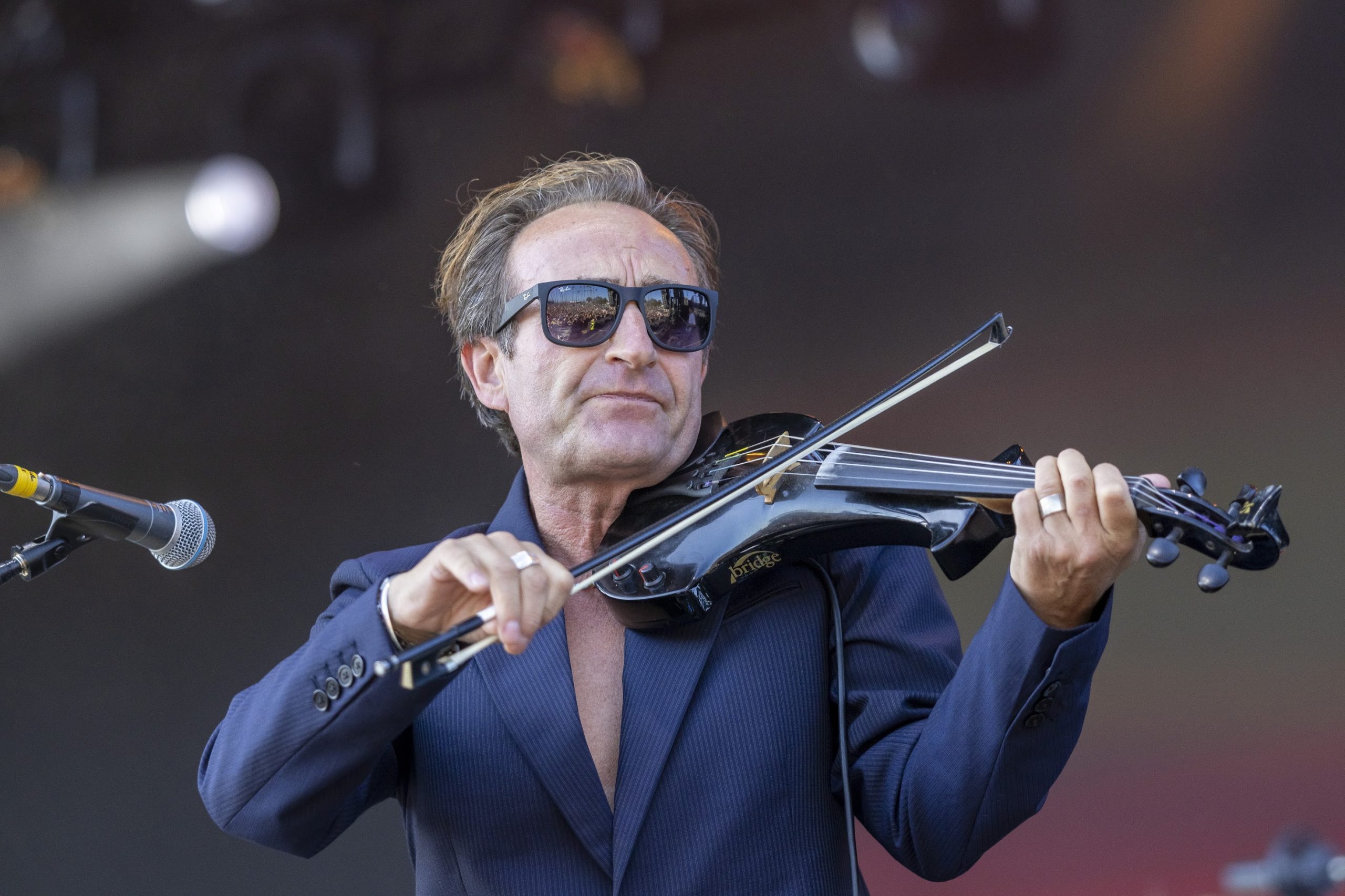
The sound was rich and immediate. Saul Davies alternated between guitar and violin, weaving melodic threads that gave each song depth and air. Andy Diagram’s trumpet—a signature part of the James sound—soared above the guitars, lending the songs a cinematic sweep that felt both nostalgic and new.
By the time they reached “Laid,” the sun was dipping low over the Pacific, bathing the crowd in golden light. Booth grinned as the opening chords rang out, the audience erupting into instant recognition. Thousands sang every word—joyously, shamelessly—turning the classic into a full-beach chorus. “This song’s older than some of your children,” Booth teased. “And still a bit naughty.”
By the time Wet Leg hit the main stage at Ohana Festival 2025, the sun hung low over Doheny State Beach, and the weekend crowd was ready for a dose of unfiltered fun.
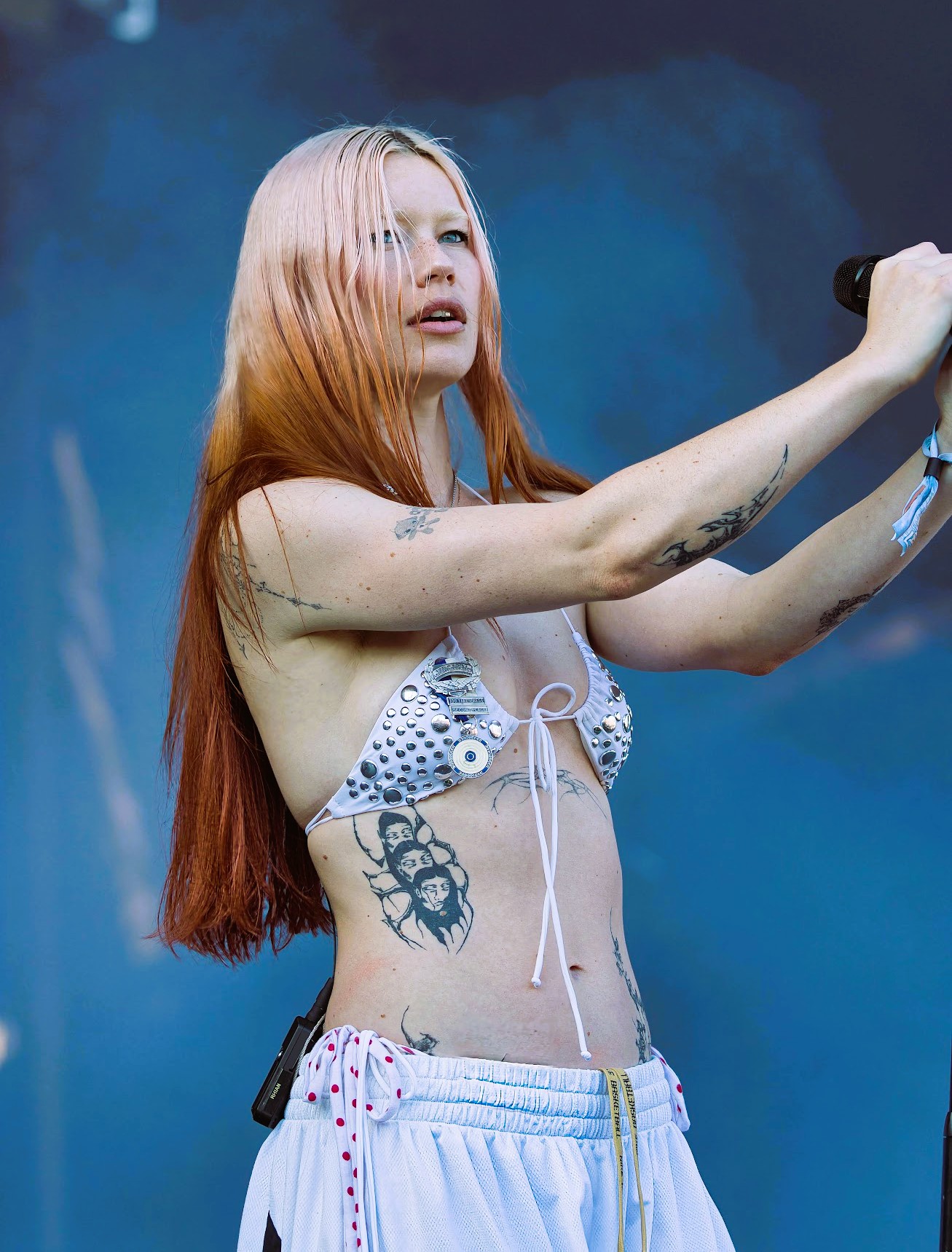
The Isle of Wight duo—Rhian Teasdale and Hester Chambers—brought their signature mix of deadpan wit, jangly post-punk, and cheeky charm, turning a lazy Sunday afternoon into a gleeful, guitar-charged release.
What might have been just another indie-rock set quickly became one of the most delightfully offbeat moments of the day. Wet Leg didn’t just play their songs—they inhabited them, oscillating between sarcasm and sincerity in a way that only they can pull off. Opening with “Catch These Fists,” the band immediately set the tone: fuzzy guitars, hypnotic rhythm, and Teasdale’s sly delivery cutting through the salty air. From the first verse, she was equal parts frontwoman and provocateur, throwing glances at the crowd like inside jokes. Chambers stood slightly to the side, quietly stoic and effortlessly cool, her guitar lines weaving playfully through the chaos.
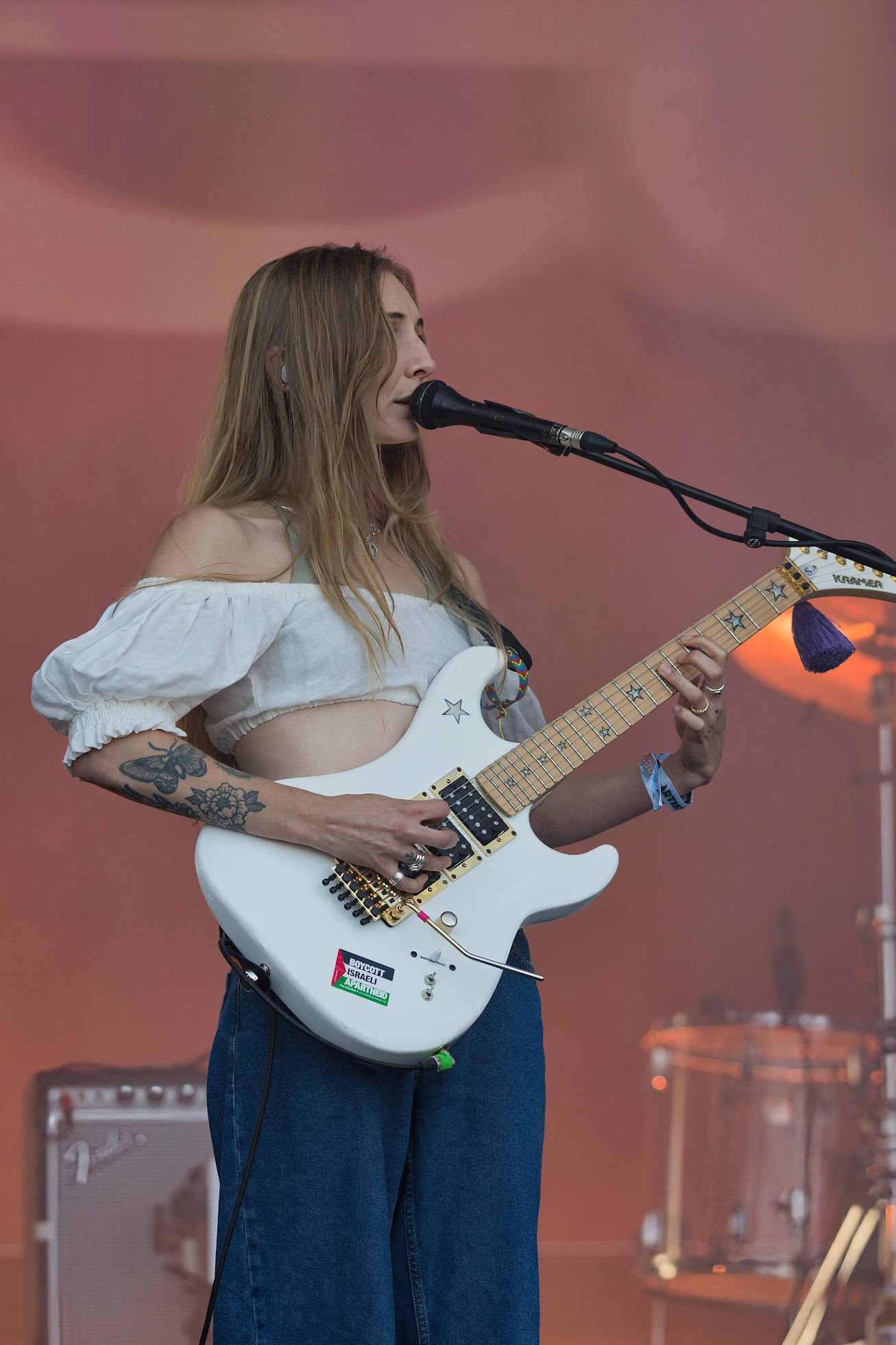
As they moved into “Wet Dream,” the crowd came alive—dancing, laughing, and shouting along to the now-iconic refrain, “What makes you think you’re good enough to think about me?” The song’s humor landed perfectly in Ohana’s sunlit setting, where irony met warmth, and indie mischief met surfside bliss. Even newer material, teased from what Teasdale jokingly called “album two-ish,” showed growth beyond their viral debut. The band’s sound has expanded—a little more groove, a touch more polish—without losing its scrappy edge. Behind the irony and internet-age humor, there’s genuine emotional intelligence in Wet Leg’s songs. Tracks like “Too Late Now” hit differently live—their mix of anxiety and euphoria perfectly capturing the mood of a generation trying to laugh its way through uncertainty.
By the time the first chords of “Chaise Longue” rang out, the field erupted. The duo’s breakout anthem—equal parts absurd and addictive—turned the crowd into a dance floor. The band stretched it out, teasing the groove, letting fans shout every absurdist line: “Is your muffin buttered?” became a rallying cry of pure joy.
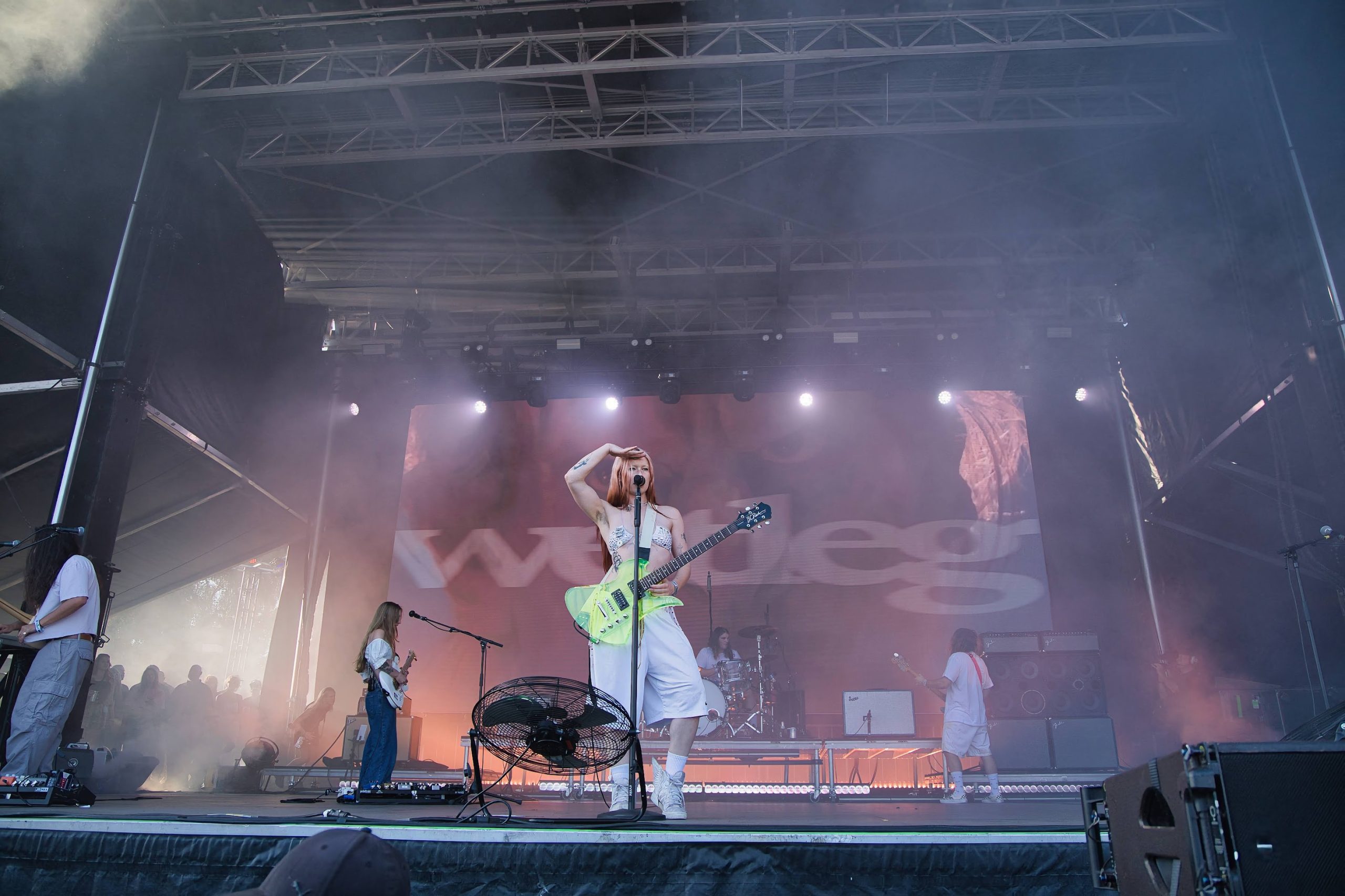
As the song closed, Teasdale waved to the sea of grinning faces and said simply, “You’ve all been very well-behaved. Don’t tell your mums.” Then she and Chambers hugged, sharing a look that said they still couldn’t quite believe all this was real.
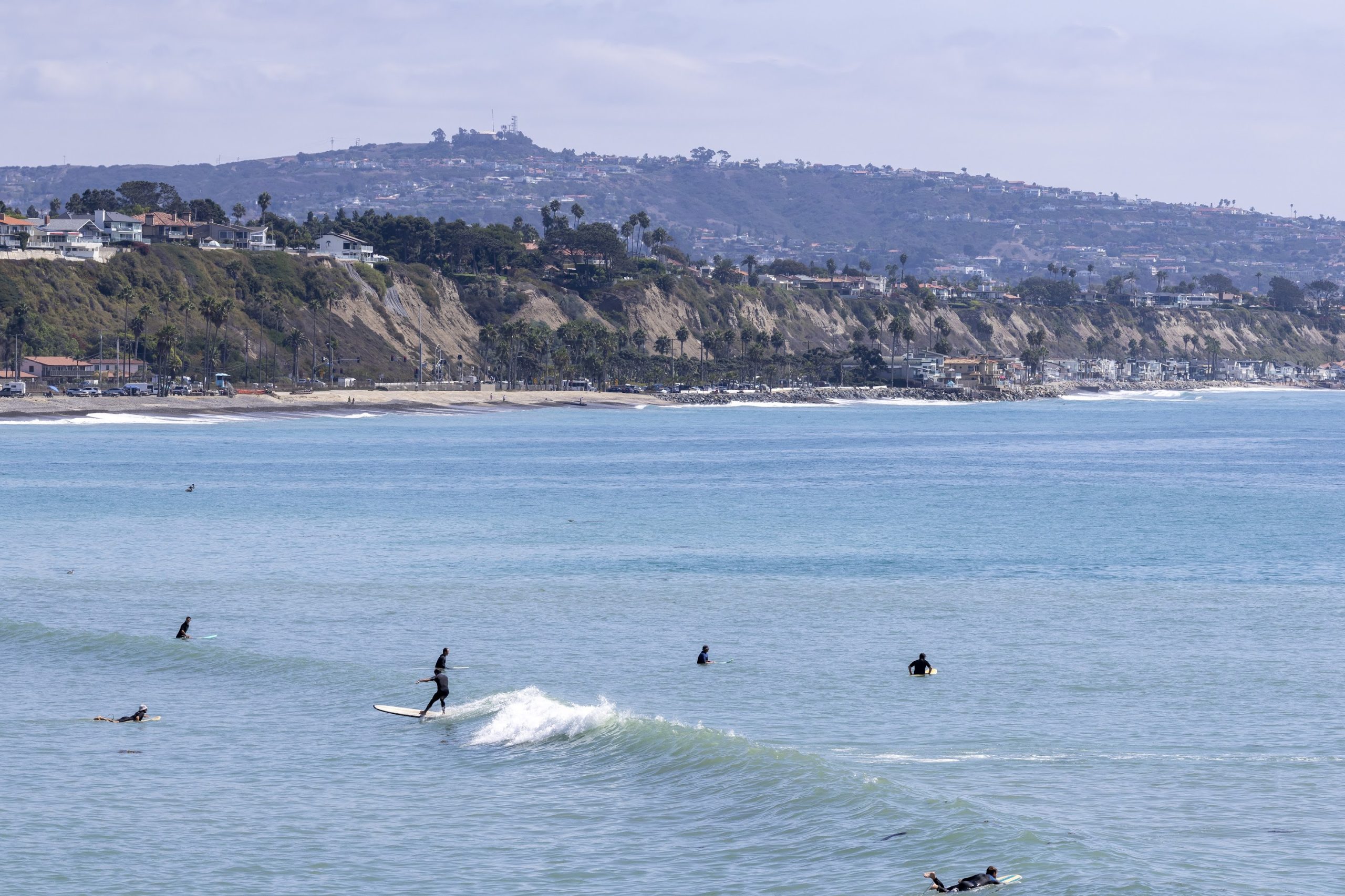
On the final day of the Ohana Festival, Cage the Elephant delivered a high-voltage performance under the California sunset that thrilled the Doheny State Beach crowd. The band’s set, which preceded the festival’s headliners, struck a perfect balance between their raw, chaotic rock energy and emotionally resonant moments.

Frontman Matt Shultz commanded the stage with his signature unhinged energy. A blur of motion, Shultz thrashed, leaped, and spun, drawing the audience deeper into the music with every move. His unpredictable and magnetic swagger was a clear reminder of why the band is considered one of America’s most electrifying live acts. Shultz is known for his frenetic and captivating physical presence, which was on full display at the festival. He is a blur of motion on stage, thrashing, leaping, and spinning, drawing the audience deeper into the performance with his every move.

The setlist, which included tracks from across their nearly two-decade career, was packed with fan favorites. The set opened with “Broken Boy,” and the band tore through hits like “Cry Baby” and “Spiderhead” with chaotic precision. For older hits, including “Ain’t No Rest for the Wicked,” the beach became a massive sing-along. The band also highlighted their more introspective side with emotional performances of “Trouble” and “Shake Me Down,” turning the festival grounds into a cathartic space for the audience.
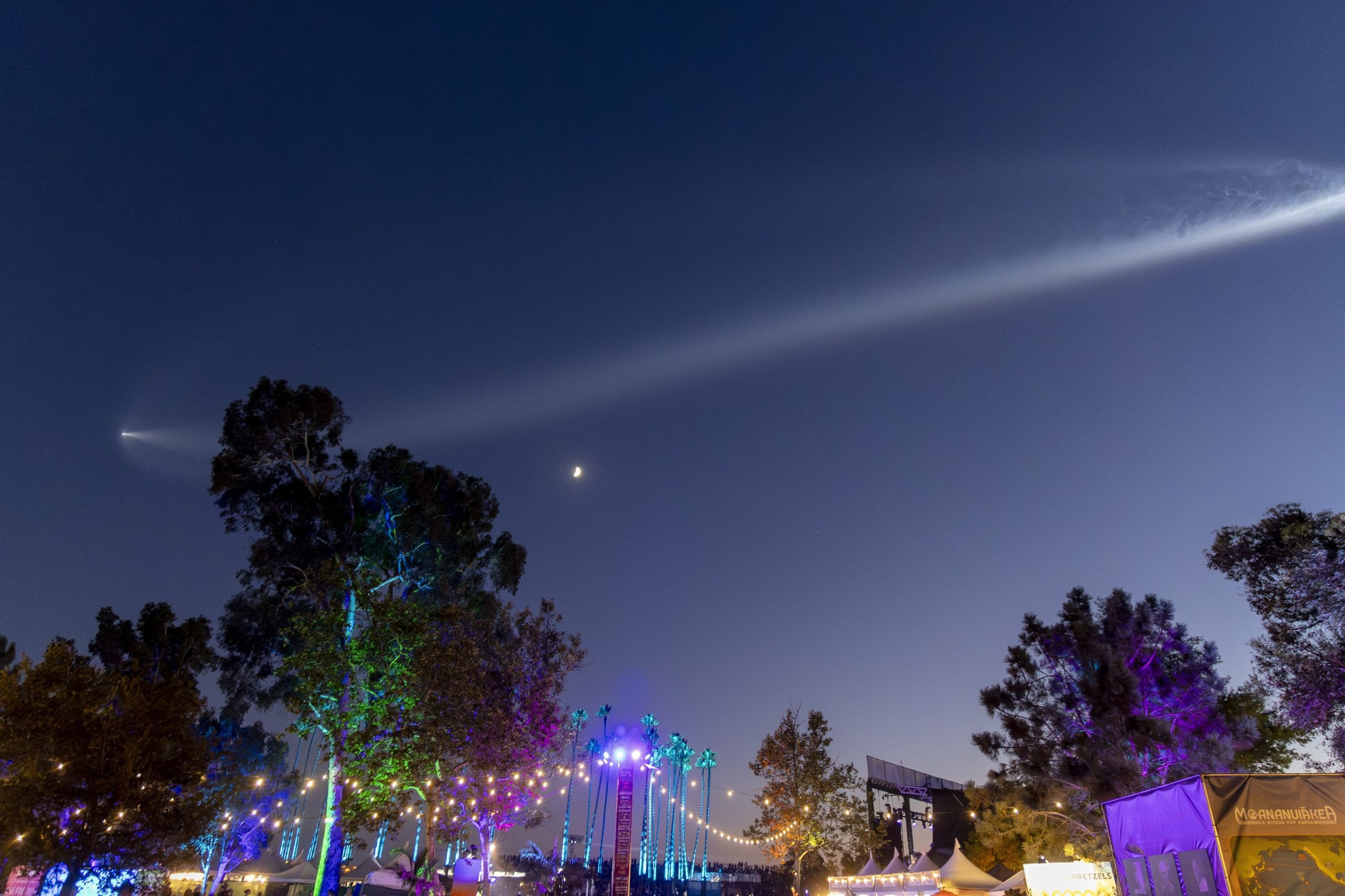
During the song “House of Glass,” the sky lit up with the launch of a SpaceX Falcon 9 rocket from Vandenberg Air Force Base. Shultz playfully acknowledged the unbelievable timing, joking to the crowd, “Well… I guess we just all witnessed a UFO… or something.” This cosmic event was followed by a heartfelt rendition of the cinematic track “Cigarette Daydreams.”
Green Day closed out the weekend with a headlining set that was loud, anthemic, and gleefully over the top. Playing to what was likely the biggest crowd in the festival’s history, the punk legends proved they have not lost a step in their energetic and spirited live performance. The beach at Doheny State Beach was transformed into a massive, raucous celebration of punk rock, filled with sing-alongs and a feeling of communal joy.
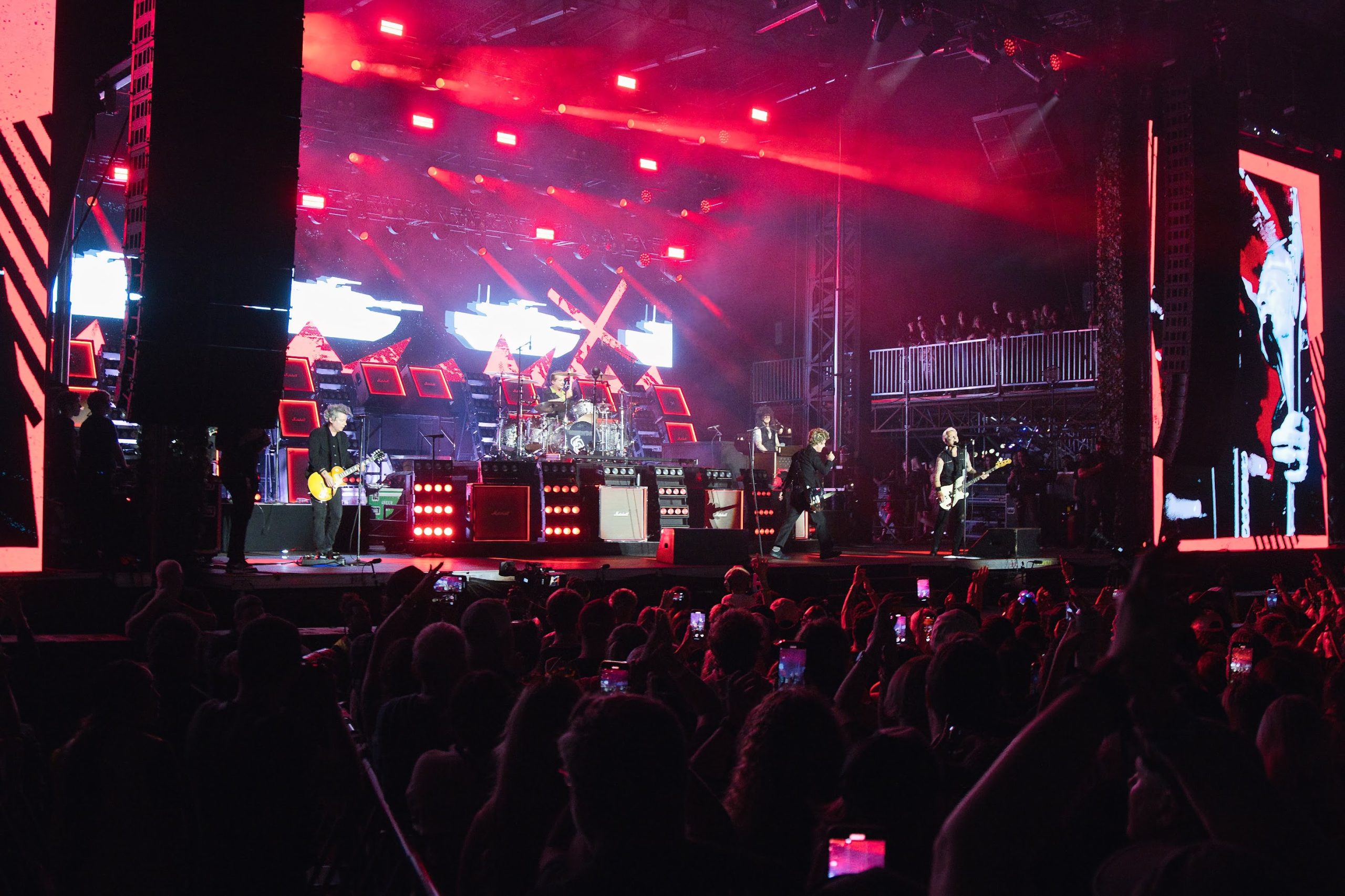
The band kicked off their set by hyping the crowd with classic tracks like Queen’s “Bohemian Rhapsody” and the Ramones’ “Blitzkrieg Bop.” The high-energy set began with the iconic “American Idiot,” during which frontman Billie Joe Armstrong notably updated the lyrics to protest the “MAGA agenda.” Green Day tore through fan-favorite hits including “Holiday,” “Boulevard of Broken Dreams,” “Basket Case,” and “When I Come Around.” They also included tracks from their newest album, Saviors, giving the crowd a taste of their latest work.
The set included a heartwarming and distinctly Ohana moment when festival founder Eddie Vedder joined Green Day on stage. Vedder came out to play with the band during their set-closing performance of the classic “Good Riddance (Time of Your Life).” This collaboration epitomized the intimate, family-like “Ohana” spirit of the festival, with Vedder participating in multiple acts throughout the weekend.

The evening concluded with confetti and a full drum kit tumble by drummer Tré Cool, creating a memorable final image for both the audience and the band, as the show was near the end of their two-year Saviors tour. Green Day’s performance at Ohana proved that after decades in the business, their energy and passion remain undiminished. From bringing a fan on stage to sing a chorus to blasting fireworks during their finale, the band delivered a classic, all-out punk-rock performance that left the festival attendees hoarse and fulfilled. The night was a powerful reminder of Green Day’s enduring legacy and their ability to command a massive, devoted crowd.